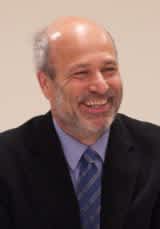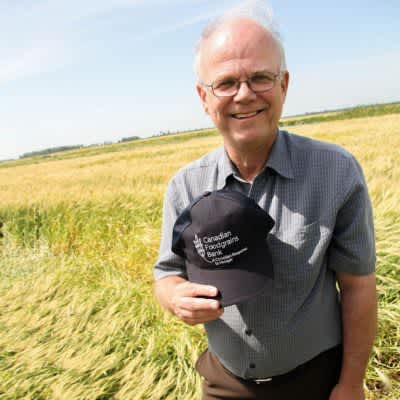Interview with Glenn Mifflin, Cuso International
Photo: Glenn Mifflin, CEO of Cuso International with Eyibio Magdalene Effiom, a beneficiary in the cassava value chain from Odukpani Local government Area of Cross River State. Eyibio completed her Entrepreneurship Development Training, and started her cassava farm after completing her training in July, 2017. She got a grant from Cuso International to implement her business idea and she currently produces and processes cassava.
Cuso International was first founded in 1961 by a group of university graduates and has since become an established volunteer coordinating agency. Looking to the future, are there any inspiring, innovative or exciting initiatives that Cuso International would like to share with our readers
Ian Smillie, in his book The Land of Lost Content, A History of Cuso recounted that Cuso was formed in 1961 out of the idealism of internationally-minded Canadians and the need to co-ordinate the pioneer initiatives of volunteer aid groups. The organization had humble beginnings but with high aspirations – driven by Canadians who believed they could change the world. Today, 58 years later, Cuso International is a well-established international development organization that is currently working in 20 countries, including with Indigenous groups in Canada.
Although volunteer placement is part of our legacy, our DNA, we are more than just a volunteer-for-development (V4D) organization, we are working differently today, partly because of how the world has changed, partly because the requirements of our partners have changed, partly because of donor and funder requirements, and partly because there are different opportunities and needs that did not exist before.
Among our unique attributes, Cuso International is truly a Canadian development organization that has built strong program credentials in: gender equality and women and girls’ empowerment; maternal and newborn health; and youth economic empowerment. So, in addition to placing more than 2,000 Canadian volunteers in the past five years, we have worked with poor and marginalized women and men from conflicted areas of Colombia to create lasting jobs, helped young entrepreneurs establish businesses in Nigeria boosting economic independence, supported and strengthened SME’s, mainly led by women in Tanzania, and improved health outcomes for mothers and babies through midwifery training.
We have included Innovation Funds in our projects that have allowed local partners to create and implement new development models for local communities, particularly for the benefit of women and youth. And, under the current VOICE program, we have engaged over 600 e-volunteers in 17 countries as of February.
Glenn, you joined Cuso International first as a board member and now as the CEO, but your professional background is in the private sector. What motivated you to take on leadership roles in the international development sector?
Yes, I built a strong career in the private sector before I joined Cuso International, first as a Chartered Accountant with Clarkson Gordon (now Ernst Young), for over a decade and a further 25 years with a mid-stream energy company. However, both my wife and I have a long history of volunteer service, so I was so pleased when presented with the opportunity to serve on the Board of Cuso International. This was a real opportunity to be involved with an organization that makes a real and lasting difference in the lives of so many people around the world. An opportunity based on real and sustainable outcomes.
As you can appreciate, initially, my primary Board responsibilities was with the Board’s Finance and Audit Committee. This posting gave me good insight into both the financial details of the organization’s programing and the details of the tremendous outcomes of the programs themselves. When the CEO role became vacant, the opportunity to continue to make a real difference was important for me to fulfill.
Cuso International has had its ups and downs like many international development organizations in Canada. What words of wisdom might you share with other organizations and leaders in the sector who are facing challenging times?
I would not presume to offer words of wisdom to other leaders or other organizations in the sector. If anything, I have benefited more from the skills, ability and thoughtfulness of the sector than I have given back.
And, I was not part of the great history of contributions that Cuso International has made around the world. I can say however, that I am proud of being a little part of that history – a history that can boast over 16,000 placements in over 100 countries. In my meetings and discussions with our returned volunteers and with several of our friends and beneficiaries, I can say that the most common description of the experience is that it is truly transformational.
I will also say that the sector benefits greatly from the support of the Canadian government. We need to remind our elected officials of the importance of our work, that Canada is committed to international development, and the difference we make in the world is an important reflection of our Canadian values.
Glenn, is there a single motto or phrase that informs your work at Cuso International?
Skills to share, futures to build.
Cuso International is a valued member of CCIC. Could you let us know why Cuso chooses to be part of this dynamic community of members?
Staying connected to our sector through CCIC supports our mission. We are stronger and more effective when we work with like-minded organizations to support the greater good.



